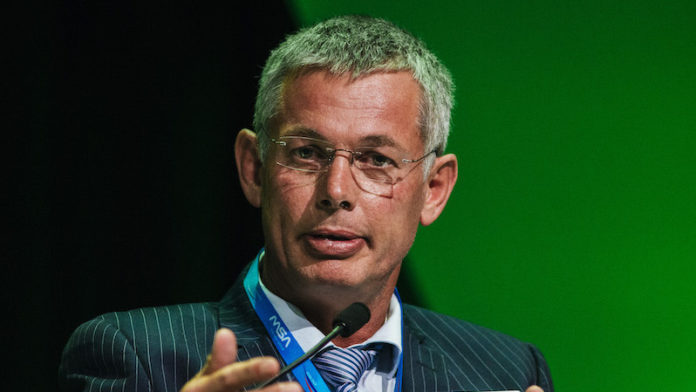
Impala Platinum has come out of the initial stages of the Covid-19 pandemic in excellent shape, helped by a supportive price environment for its metals. In an interview conducted in July, Nico Muller, CEO of the platinum firm, comments on operating the company in the grip of the Covid-19 pandemic.
What positives do you draw from Covid-19 to the way you, as a CEO, work?
There have been several important lessons and growth points from Covid-19. These include the critical value of teamwork, which saw us successfully and safely migrate all our South African operations to care and maintenance, at short notice, and in several days to comply with South Africa’s hard lockdown in March. This was a massive feat, which would not have been possible without well-run, dedicated teams.
In addition, it is evident that empowered employees are more likely to produce the innovative thinking that differentiates great companies from merely good companies. I can honestly say that I have experienced exceptional leadership and direction in the way our executives have navigated the effects of Covid-19 at their operations. I observed early and decisive decision-making, extensive engagement and, most importantly, creative approaches that placed that health and safety of our employees first.
On a more personal note, I have come to reject any response which starts with “it’s not possible”. Our team is demonstrating the art of the possible every single day. Not least of which is the rapid migration of a workforce of 50,000+ “online” via our mobile-based employee app, through which we will be able to conduct daily Covid-19 screening questionnaires to streamline our processes.
One of the problems cited by current Covid-19 restrictions is getting back to 100% production. Do you think this is possible, given the social distancing and other restrictions?
Consistent, 100% production will not be possible in the short term while the countries in which we operate are still in the tight grip of the Covid-19 pandemic, for several reasons.
While 100% production is allowed at all our operations at present, this may change as infection rates in the areas in which we operate spike. It is possible certain areas that become hotspots could be obliged to move to lower production levels, or care and maintenance. The South African government, for example, has clearly communicated that it will follow a risk-based approach in response to the coronavirus pandemic.
This implies that restrictions imposed by government across the country (Level 0-5), will change over time based on the intensity and spread of the virus in these areas. We know that we are only at the start of the pandemic in South Africa and must accordingly prepare for a significant escalation in reported infections over time. We should definitely expect potential moves down and up in restriction levels over time based on our collective efforts to moderate the spread of the pandemic.
This article was first published in the Mining Yearbook 2020 which is available here: https://www.miningmx.com/the-mining-yearbook-2020/.
At all stages of the pandemic’s curve, we will have employees in quarantine after being exposed to a Covid-infected individual, and employees in isolation recovering from a Covid infection. This reality makes the job of team planning more difficult, and all teams may not have full complements of the required job function, which affects production.
In the event of a cluster of infections, such as the 25 infections we saw at our Lac des Iles mine in Canada in April, an operation, or a portion of an operation, may need to be placed on care and maintenance for a period to control a cluster of infections.
Social distancing measures implemented at operations also means that not all teams are at full complement, and thus not at 100% production.
Universal testing looks difficult to implement and probably ineffective considering the efficacy of tests and the backlog. So a lot is down to employee behaviour, which will surely test the strength of company-to-labour and union relations. Your thoughts?
Test efficacy and the laboratory backlogs have proved challenging in our experience thus far. In addition, test availability is increasingly becoming an issue. Employee (and community) behaviour is key to mitigating the spread. We have worked very closely with our social partners and other key stakeholders in creating awareness, and launched employee- and community-focused education campaigns in all the areas in which we operate, in addition to other initiatives to deep-clean and equip schools and provide sanitising and disinfectant resources to local taxi operations, among others.
Education and awareness, together with support for employee well-being (health, mental wellness, and financial/debt counselling) are ongoing. Our relationship with our dominant unions has been a constructive one, and the collaboration on employee and community awareness and education has been welcome.
We’ve seen divergence among the market watchers – WPIC, CFA Oxford and JM on the extent of the platinum deficit in 2020. What’s your reading of the platinum market for this year specifically?
As yet, the group has not seen a meaningful change in requirements for our metals. While it will take some months (if not years) for the full economic impact of the pandemic to be revealed, market deficits for both palladium and rhodium are likely to persist in our view, given the material impact of supply interruptions that have countered demand destruction, with the unusual but fortuitous confluence of the timing of these interruptions. We see platinum in a narrower than previously expected surplus – the impact of supply shocks and strong investment demand have more than offset the impact we expect on auto, jewellery and industrial demand.
While our understanding of the demand impact of the pandemic will evolve in the coming months, our initial view is that changes in previously forecast demand are likely to be cyclical rather than structural, and hence do not require meaningful adjustments to production strategies or commodity exposure.
If ever the hydrogen economy received a shot in the arm, this is it, right? Covid-19 has focused civil and public sector attention on environment. How will that benefit your company in a rand and cents kind of way?
Several ‘mega-trends’ are likely to be expedited by the COVID-related crisis – with many commentators calling for government stimulus to be directed in a way that supports and accelerates decarbonisation and environmental stewardship. A push for green stimulus has provided further evidence of the extent to which hydrogen has become ‘mainstream’ and bodes well for the structural demand for platinum provided by this nascent segment.
We think the timeframe over which the hydrogen economy becomes mainstream has been accelerated by two to three years in particular. From a rand and cents perspective, it helps reduce the risk to the evolution of demand support for platinum towards the end of the decade – it gives us greater confidence on our pricing assumptions in the medium and longer term and helps us plan our business better.
There are concerns among business about government’s plan to reset the economy. What do you make of its comments: opportunistic politics from within the ANC, or an opportunity to re-open the debate on positive reform?
We have every sympathy for the unenviable challenges the government is facing on multiple fronts in dealing with Covid-19, the associated economic fallout and the frustration across the country. Suffice to say, left unaddressed, we are facing a less sustainable, less equal, and more fragile future – and entirely new foundations for our economic and social systems need to be built.
This is definitely an opportunity to re-open the debate on positive reform. We are encouraged that the president has very clearly opened the way for greater collaboration with business and other social partners, which will help make the breakthroughs necessary to work towards economic recovery and the restoration of jobs. It is vital government improves coordination (tax, regulation, fiscal policy), creates the conditions for a stakeholder economy, and invests in shared goals, such as equality and sustainability.











